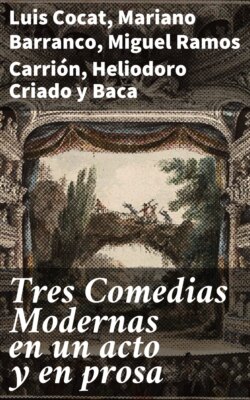Читать книгу Tres Comedias Modernas en un acto y en prosa - Heliodoro Criado y Baca - Страница 3
На сайте Литреса книга снята с продажи.
PREFACE
ОглавлениеÍndice
It is hoped that this collection of modern Spanish comedies may be found useful as a contrast to the heavier reading material provided by the Spanish novel and short story. The novel should be studied in our courses as the great literary achievement of Nineteenth Century Spain; the short story, because it possesses the virtue of concentration. But Spanish prose, whether of the novel or the short story, offers peculiar difficulties to the English-speaking student. The periodic sentence, a surfeit of qualifying epithets, inversion, rhetorical and sententious monologues (cf. Galdos's novels), and, in the longer novels, complication and elaboration of plot, are obstacles in the way of the student's appreciation of the real beauties of this literature.
The language of these prose comedies, slightly embellished as all literary expression must be, is that used in conversation by the Spaniard of to-day, and on that account should prove valuable in furnishing the student with those living idioms and constructions that are rarely found in the longer novels.
In deference to American propriety, an occasional word or two, and in two cases entire scenes, have been omitted. In La Muela del Juicio one scene has been omitted and another shortened on account of the presence of dialect; elsewhere, with a few exceptions, dialect forms have been given their Castilian equivalents. These changes have in no wise affected the plot or general interest of the plays.
It has not been thought necessary to furnish biographical sketches of the authors. With the exception of Ramos Carrión, who has attained a national reputation as a writer of comedies in prose and verse, they have not distinguished themselves from the many facile playwrights who entertain the public of Madrid.
The editor wishes to acknowledge his indebtedness to Dr. J. A. Ray, who was originally associated with him in the undertaking, but was compelled to withdraw from it at an early stage. About a third of the vocabulary is to be credited to him.
F. W. M.
U. S. Naval Academy, September, 1909.
BIBLIOGRAPHICAL NOTE
Padre Francisco Blanco García, La Literatura en el Siglo XIX, Madrid 1891-4, 3 vols., in vol. 2, Cap. XXIV, Últimas evoluciones de la literatura dramática (conclusión) = Los géneros cómico y bajo-cómico.
Jacinto Octavio Picón, Prólogo to selections of Ramos Carrión's plays in Teatro Moderno, vol. 1, Madrid, 1894.
E. Gómez de Baquero, in Letras é Ideas, Barcelona, 1905, pp. 9-22, article entitled Filosofía del Género Chico, pp. 9-22.
